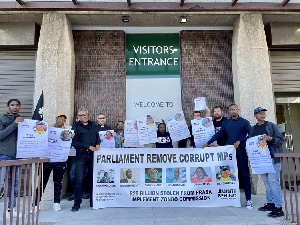- Boxing
- Athletics
- Basketball
- Bodybuilding
- Cricket
- Golf
- Handball
- Hockey
- Martial Arts
- Tennis
- Volleyball
- Other Sports

Africa News of Monday, 28 April 2025
Source: www.ghanawebbers.com
South Africa: Parliament Accuses Activists of Abusing Court Process
#UniteBehind Challenges Parliament's New Code of Conduct
#UniteBehind is challenging the constitutionality of Parliament's new Code of Conduct. The organization claims the code was passed in secret. They argue it allows corrupt MPs to escape accountability when they resign. Anthea Gordon, Parliament's registrar of members' interests, accuses #UniteBehind of misusing court processes. She says they shifted their focus from the old code to the new one.
Since 2022, #UniteBehind has taken legal action against Parliament's Ethics Committee. They argue that parliamentarians implicated in state capture have not been held accountable. In 2023, #UniteBehind filed a court case against Parliament. Initially, their case focused on the existing Code of Ethics and its secrecy provisions.
In February 2024, #UniteBehind amended their motion in court. They challenged the constitutionality of the new Code of Conduct adopted just before the 2024 elections. They claim it lacked public participation and did not notify them about its adoption.
Gordon states that #UniteBehind cannot change its "cause of action." She argues that their challenge to the old code is now "moot" and unwinnable. She denies that the new code was adopted hastily or secretly. The review process for the old code began in 2022 and was published publicly in March 2024.
Gordon explains that while referred to as a new code, it is an amendment to the old one. It primarily affects Members of Parliament and does not directly impact the public. Therefore, public involvement through MPs was sufficient.
She adds that Parliament has discretion under the Constitution regarding public involvement for internal matters. The new code includes necessary secrecy provisions to protect personal information.
In his response, Zackie Achmat from #UniteBehind criticized this view as self-serving. He emphasized that public participation is essential for democracy and noted a lack of consultation on the new code. Achmat believes this undermines trust in Parliament as MPs can evade accountability.
He refers to this amendment as the "Mbalula escape clause." This clause protects former Minister Fikile Mbalula and others from being held accountable for corruption related to state capture.
Achmat argues that both codes maintain secrecy provisions which hinder transparency. He suggests using redaction methods instead of blanket secrecy to enhance accountability.
He insists that justice requires these matters be heard in court. Achmat urges affirmation of participatory democracy and public involvement in parliamentary processes.
He expresses confidence that the court will recognize benefits for Parliament by preventing MPs from escaping justice. He stresses that secret procedures are detrimental to society and democratic institutions.
Achmat emphasizes holding those responsible for damaging organizations like PRASA accountable is crucial for building a just society based on democratic values and rights.
The hearing is scheduled for August 7th.











